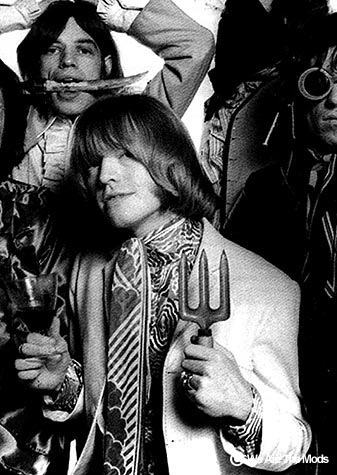
No Expectations
You Got The Silver/Ruby Tuesday/Paint It, Black

Jumpin' Jack Flash is what rescued the Rolling Stones from their psychedelic dead-end, and sent them rushing back to a heavy rock and blues base. The cascading riffs at the beginning boil with an urgency that even fellow deviants in the Velvet Underground would have appreciated.
In 1968, Mick Jagger called the track "the most basic thing we have done this time". PRIMAL is more like it. If 'Satisfaction' initially transformed these five London boys from cheap blues copyists, then 'Jumpin' Jack Flash' revealed them at their most dangerous and refined, crafting rock and roll of unstoppable force and utter perfection.
The era of pop was over for Jagger and Richards. 'Jumpin' Jack Flash' was their ultimate musical manifesto on the band's new sound and purpose, setting a standard for rock and roll just as 'Hound Dog' and 'Johnny B. Goode' had done a generation earlier.
"When I play that first riff in Jumpin' Jack Flash, something happens in my stomach - a feeling of tremendous exhilaration, an amazing superhuman feeling," Richards once told authour Terry Southern. "An explosion is the best way to describe it. You just jump on that riff, and IT plays YOU. It's the one feeling I would say approaches nirvana."
Bill Wyman has always claimed authorship of the song's key riff, created while jamming on an electronic keyboard with Charlie Watts and Brian Jones. Richards has acknowledged as much in later interviews, though the song is credited to Jagger/Richards. "It happened frequently that basic ideas and middle bits by Brian, Charlie and me went into the melting pot during long studio sessions," Wyman wrote in his autobiography,"but over a period of hours or days the origins of our suggestions disappeared...I'd dismiss it with a laugh rather than argue at the time - who wants a disagreement in the studio when you are all trying to be creative?"
The recording of 'Jumpin' Jack Flash' emerged during the early sessions for Beggar's Banquet at Olympic Studios in London, and was the first time the Stones worked with producer Jimmy Miller. The result was a track of raw, driving force, propelled by that immortal riff pattern. Lyrically, the structure is not unlike Bo Diddley's 'Who Do You Love?', but Jagger is perfecting a strange and unique persona here, a voice that is powerful, stormy, outrageous. The singer would forever be known to many by that alter ego, "Mr Jumpin' Jack Flash".
A promotional film by Michael Lindsay Hogg (later to direct the Stones' Rock And Roll Circus and the Beatles' Let It Be) presented the Stones to BBC audiences performing the song in war paint and instilled new fears about a Satanic influence on their music. But the kids knew what they were seeing: the Stones reborn, filled with new energy, finally broken free from the passing plastic fashion of Carnaby Street.
Words are few in 'J.J.F', but they seem to recount a brutal childhood, with grim scenes of poverty and abuse. "But it's all right now, in fact it's a gas." Jagger sings in a leering, haunted tone. For him, the song represented a return to clarity after a long season of acid madness. "It's about having a hard time and getting out," Jagger told Rolling Stone in 1995. "Just a metaphor for getting out of all the acid things."
The song is played with even more swagger on the Get Yer Ya-Ya's Out live album from the 1969 tour, but nothing can quite match the impact of the original recording. It was a sound and fury that even such later classic Stones tracks as 'Brown Sugar' could only approximate. That 3:39 minute assualt recorded in 1968 stands as the prototype for much of what followed from the "World's Greatest Rock And Roll Band", and remains a crucial, untouchable document. Unless your name is Mick Jagger.
The singer's indifference to the importance to the importance of rock in general, and the Rolling Stones' music in particular, is notorious and even bizarre, as engineer Dave Jerden was to discover while working on both Dirty Work and Jagger's She's The Boss. One day in Paris, Jerden was summoned by Jagger into a studio. The Glimmer Twin was ther to record a new vocal of 'J.J.F' for a Whoopie Goldberg film of the same name. Jagger had the original master with him.
"Well I should make a copy," Jerden said, noting that there were no open tracks left on the tape for a second vocal. "No, I'll just go over the original vocal" Jagger replied. Which he did, meaning the original master performance is now gone forever. So much for history. "That's the way Mick is," says Jerden now. "To him, all this other stuff about the history just doesn't really mean anything to him. he's got this cavalier attitude about the Stones stuff. Keith is not like that. For him, everything about the Stones is sacred."